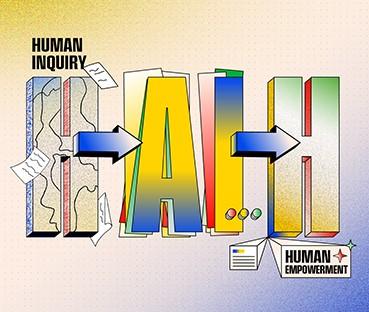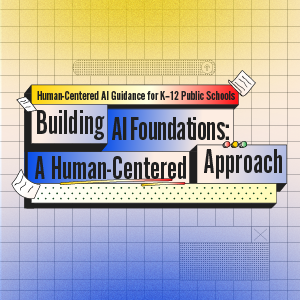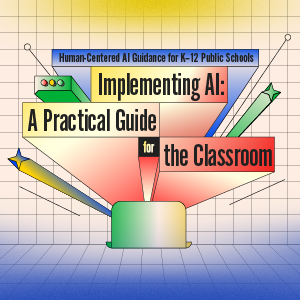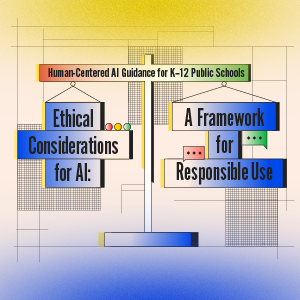Human-Centered Artificial Intelligence in Schools

Quick Downloads
Accessible Formats
AI Stories
Artificial Intelligence (AI) is here to stay. As this new technology continues to evolve, educators must prepare students to understand and use these tools. In Washington state, educators are already integrating AI-assisted technologies in schools and empowering students to do the same. The state's responsibility is to provide students, educators, and school district administrators with the resources and tools they need to understand how to use these technologies effectively, ethically, and safely.
The rapid development of AI tools has created opportunities for educators to rethink the way they approach student learning. As our state embraces these changes, it is important to remember that human reflection and understanding are key to AI generation. This "Human-AI-Human" approach to AI puts our students and educators at the beginning and end of all interactions with AI.
AI Innovation Summit
The 2025 AI Innovation Summit is an opportunity for school district board members, administrators, educators, and IT professionals to explore AI in K–12 education. The Summit will offer a comprehensive program catering to all skill levels, ensuring valuable learning experiences for everyone. Individuals and teams will have the option to register for one of two day-and-a-half-sessions or for all three days. Sessions for beginner and intermediate participants will be available on all three days of the conference. For those ready to dive deeper, advanced sessions focused on creating AI-driven solutions will be exclusively available on Wednesday.
February 3–5, 2025 | SeaTac, WA
Comprehensive Human-Centered AI Guidance for K–12 Public Schools
The third version of the Comprehensive Human-Centered AI Guidance for K–12 Public Schools provides a guide for ethical considerations for AI and responsible use in the classroom. The Accessible Format of the Comprehensive Guidance is a user-friendly document that is available for download.
The Superintendent's Message
What AI Is and What AI Is Not
Generative Artificial Intelligence (AI) refers to software tools that use large amounts of data to produce text, images, videos, or other digital artifacts. These policies and guidelines can help educators understand AI terminology and recognize misconceptions about the effects of AI on student learning.
In the educational context, AI-assisted learning can look like personal tutoring programs, virtual assistants, and software with the capability to generate lesson plans within seconds. It is important to note that educators and students must remain at the center of instruction and learning in these cases.
Guidelines and Policy
The National Institute of Standards and Technology (NIST) AI Risk Management Framework and the TeachAI Toolkit serve as foundations for OSPI's guiding principles on the use of AI in education.
- Human-Centered Approach to AI: A human-centered AI learning environment is one that prioritizes the needs, abilities, and experiences of students, teachers, and administrators.
- Implementing AI in Student Learning: Empower students to actively shape their learning experience with AI by allowing them control over how and to what extent AI is integrated into their education.
- Sensitive or Confidential Data: District policies must comply with student/personal privacy and data protection laws for the use of all AI tools and resources.
Educational policymakers must focus on ensuring that the use of AI increases the public good, with emphasis on equity and inclusion. AI policy and use should be geared to improving learning for every student, empowering teachers, and strengthening learning management systems. It is important that policies also consider student safety and well-being, and provide access to educational tools for all students.








